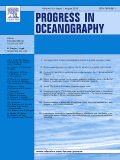
PROGRESS IN OCEANOGRAPHY
Scope & Guideline
Unveiling the Mysteries of Our Oceans
Introduction
Aims and Scopes
- Ocean Dynamics and Circulation:
Research focusing on the physical processes that govern ocean circulation, including currents, tides, and eddies, and their interactions with the atmosphere and climate. - Marine Ecosystem Dynamics:
Studies examining the structure and function of marine ecosystems, including trophic interactions, biodiversity, and the impacts of environmental variability on marine species. - Biogeochemical Processes:
Investigations into the cycling of nutrients and organic matter in the ocean, including carbon cycling, primary productivity, and the impacts of anthropogenic changes. - Climate Change Impacts:
Research assessing the effects of climate change on marine environments, including shifts in species distributions, changes in ocean temperature and acidity, and implications for fisheries. - Technological Advances in Oceanography:
Development and application of novel technologies and methodologies for ocean observation, including remote sensing, modeling, and in situ measurements.
Trending and Emerging
- Climate Change and Marine Ecosystems:
An increasing number of studies are investigating the effects of climate change on marine ecosystems, including shifts in species distributions, phenology, and community structure in response to warming and acidification. - Microbial and Zooplankton Dynamics:
Research focusing on the roles of microbial communities and zooplankton in marine food webs and biogeochemical cycles is gaining prominence, reflecting their critical roles in nutrient cycling and ecosystem health. - Ecosystem-Based Management Approaches:
There is a trend towards integrating ecosystem-based management strategies in marine research, emphasizing the need for holistic approaches to manage marine resources in the context of environmental changes. - Technological Innovations for Monitoring:
The adoption of advanced technologies such as autonomous vehicles, satellite remote sensing, and machine learning for ocean monitoring and data analysis is emerging as a significant theme in recent research. - Biodiversity and Conservation Studies:
Increased attention is being paid to biodiversity assessments and conservation strategies, particularly in light of anthropogenic impacts and the need to protect vulnerable marine ecosystems.
Declining or Waning
- Traditional Fisheries Studies:
Research that primarily focuses on stock assessments and conventional fisheries management seems to be less frequent, as the journal increasingly prioritizes ecosystem-based approaches and the impacts of climate change on marine resources. - Static Habitat Mapping:
Previous emphasis on static maps of marine habitats is declining in favor of dynamic models that account for temporal changes and the influence of physical processes on habitat distribution. - Single-Species Focus:
There is a noticeable decrease in studies that focus exclusively on single-species assessments, as interdisciplinary approaches that consider community dynamics and ecosystem interactions gain traction.
Similar Journals
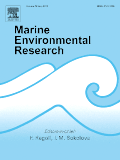
MARINE ENVIRONMENTAL RESEARCH
Uncovering the Secrets of Aquatic EcosystemsMarine Environmental Research, published by Elsevier Science Ltd, is a premier journal in the field of aquatic science, oceanography, and environmental pollution, with an impressive 2023 Q1 ranking in multiple categories, including Aquatic Science and Oceanography. Established in 1978, this journal serves as a vital resource for researchers, professionals, and students dedicated to understanding marine ecosystems and the impacts of human activity on these environments. It fosters interdisciplinary dialogue, providing a platform for original research, reviews, and case studies that explore critical issues such as marine biodiversity, pollution, and ecosystem health. While the journal maintains a sophisticated peer-review process, it is committed to advancing knowledge without compromising rigorous academic standards. With its strong Scopus ranking, including significant positions in Aquatic Science and Oceanography, Marine Environmental Research continues to play an essential role in shaping the future of marine environmental research and conservation efforts globally.
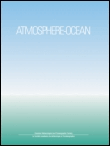
ATMOSPHERE-OCEAN
Advancing Knowledge in Atmospheric and Oceanic InteractionsATMOSPHERE-OCEAN is a premier peer-reviewed journal published by Taylor & Francis Ltd, dedicated to advancing the fields of atmospheric science and oceanography. Since its inception in 1963, this journal has served as a crucial platform for researchers, professionals, and students, facilitating the dissemination of significant findings and innovative methodologies in understanding the complex interactions between the atmosphere and the ocean. With its journal ranking in the Q3 category for Atmospheric Science and Q2 for Oceanography as of 2023, along with its Scopus rankings, ATMOSPHERE-OCEAN maintains its relevance by addressing current topics such as climate change, hydrology, and ocean circulation patterns. For those seeking to contribute to or stay informed about the latest research in these critical fields, ATMOSPHERE-OCEAN is an invaluable resource that combines rigorous scholarship with practical implications for environmental management and policy.

Frontiers in Marine Science
Connecting Science and Sustainability for Ocean HealthFrontiers in Marine Science, published by FRONTIERS MEDIA SA, stands as a leading open-access journal dedicated to advancing our understanding of marine ecosystems and their interconnectedness with global environmental systems. With a focus that spans a range of vital sub-disciplines including Aquatic Science, Oceanography, and Ocean Engineering, this journal has achieved prestigious rankings within the Q1 category in multiple areas as of 2023. The journal, thriving since its inception in 2014, promotes high-quality, peer-reviewed research that addresses critical challenges in marine and environmental science, making it an invaluable resource for researchers, professionals, and students alike. Located in Switzerland, Frontiers in Marine Science is committed to accessible scientific knowledge, boasting an impressive impact through a wide array of contributions from the global community. The journal's aim is to foster collaborative research efforts and innovative responses to the pressing issues facing our oceans and waterways today.
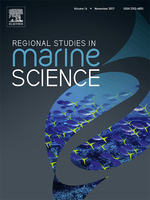
Regional Studies in Marine Science
Fostering Sustainable Practices through Marine StudiesRegional Studies in Marine Science, published by Elsevier, is a leading academic journal dedicated to advancing the understanding of marine ecosystems and their regional dynamics since its inception in 2015. With an ISSN of 2352-4855, this journal is indexed in Scopus and has achieved impressive ranking quartiles, notably Q2 in categories like Animal Science and Zoology, and Ecology, showcasing its relevance and impact in these fields. As of 2023, it ranks in the 79th percentile for Animal Science and Zoology, reflecting its significant contribution to academic discourse. While the journal operates under a traditional access model, its rigorous peer-review process ensures the publication of high-quality research that is crucial for understanding ecological interactions and fostering sustainable practices within marine environments. Researchers, professionals, and students alike will find this journal an invaluable resource for the latest findings and advancements in marine science, as it strives to bridge the gap between research and practical application at regional and global levels.
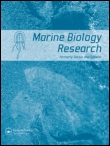
Marine Biology Research
Innovating research for thriving ocean ecosystems.Marine Biology Research is a premier journal published by Taylor & Francis, focusing on the dynamic field of marine biology and its intersecting realms of aquatic science, ecology, and oceanography. Since its inception in 2005, this journal has served as a crucial platform for researchers and professionals to disseminate their findings, with a vision extending to 2024 and beyond. The journal is recognized with a Q3 quartile ranking in both Aquatic Science and Ecology, Evolution, Behavior and Systematics, underscoring its growing influence in these fields as evidenced by its Scopus rankings. Located in the United Kingdom, Marine Biology Research aims to foster collaboration and innovation through open access options, facilitating knowledge exchange among the academic community. With a steady commitment to advancing marine sciences, this journal is an invaluable resource for those dedicated to understanding and preserving our ocean ecosystems.

Journal of Operational Oceanography
Unveiling the Secrets of the Sea with Cutting-Edge ResearchThe Journal of Operational Oceanography, published by Taylor & Francis Ltd, stands as a pivotal platform within the field of oceanography, focusing on the integration of operational practices, technology, and scientific research. With a strong impact factor and a notable Q2 quartile ranking in the category of Earth and Planetary Sciences, this journal offers researchers, professionals, and students a vital resource for disseminating new knowledge and innovative methodologies related to ocean studies. Covering a range of topics from marine data analysis to the application of oceanographic principles in sustainable practices, the journal’s content is crucial for advancing understanding in this dynamic field. Operating since 2008 and continuing through 2024, it is dedicated to fostering collaboration and dialogue among the scientific community, ensuring accessibility to essential findings that drive informed decision-making in marine science. With its commitment to high-quality, peer-reviewed articles and a ranking in the top 10th percentile of its category, the Journal of Operational Oceanography is an indispensable resource for those looking to make significant contributions to marine research.

Ocean Science
Charting New Waters in Ocean ResearchOcean Science, published by COPERNICUS GESELLSCHAFT MBH, stands as a premier Open Access journal in the fields of Oceanography and Paleontology, with a commendable impact factor that highlights its influence in the scientific community. Since its inception in 2005, Ocean Science has provided a vital platform for the dissemination of innovative research and discoveries, boasting prestigious rankings of Q1 in both Oceanography and Paleontology categories as of 2023, along with impressive Scopus rankings (7th in Paleontology and 28th in Oceanography). Based in Göttingen, Germany, the journal's commitment to open access ensures that groundbreaking research is readily available to a global audience, fostering knowledge sharing and collaboration among academics, professionals, and students alike. As it converges towards its 20th anniversary in 2024, Ocean Science continues to be an essential resource for those dedicated to advancing our understanding of the marine environment and its geological history.
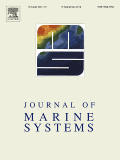
JOURNAL OF MARINE SYSTEMS
Advancing Interdisciplinary Insights into Marine EcosystemsJOURNAL OF MARINE SYSTEMS, published by Elsevier, is a leading academic journal dedicated to advancing the understanding of marine systems through interdisciplinary research. With an impressive impact factor and ranking in the Q1 quartile across various categories such as Aquatic Science, Ecology, and Oceanography, this journal has established itself as an invaluable resource for researchers, professionals, and students interested in marine science and its applications. Since its inception in 1990, the journal has been a platform for high-quality studies, offering insights into complex marine ecosystems, their dynamics, and their interactions with human activities. Notably, it is indexed in major databases, which ensures visibility and accessibility for global audiences. Researchers are encouraged to share their findings and contribute to the ongoing dialogue about the health and sustainability of marine environments.
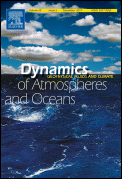
DYNAMICS OF ATMOSPHERES AND OCEANS
Charting New Frontiers in Environmental ResearchDYNAMICS OF ATMOSPHERES AND OCEANS, published by Elsevier, is a renowned journal that has established itself as a vital resource in the fields of atmospheric science, oceanography, and geology. With a rich publication history stretching from 1976 to 2024, this journal provides a platform for high-quality research that addresses the complex interactions between the atmosphere and oceans, which are critical to understanding climate change and environmental systems. It enjoys a respectable impact factor and a reputable position within its category quartiles, specifically noted as Q2 in critical domains such as Computers in Earth Sciences and Oceanography. Researchers and professionals benefit from its indexed coverage, featuring a Scopus ranking that places it among the leading journals in its categories. Although it is not an open-access journal, readers can access its cutting-edge articles through institutional subscriptions or individual purchases. The journal aims to foster cross-disciplinary dialogue and innovation by publishing original research, reviews, and insightful commentary, making it a cornerstone for scholars, students, and practitioners committed to advancing knowledge in the dynamic interplay of Earth's atmospheric and oceanic systems.

JOURNAL OF OCEANOGRAPHY
Charting New Waters in Earth SciencesJOURNAL OF OCEANOGRAPHY, published by Springer, stands as a leading academic journal in the field, with an impressive Q1 ranking in Oceanography for 2023. Since its inception in 1992, this journal has dedicated itself to the dissemination of high-quality research that spans a diverse array of topics within oceanography and earth sciences. With an ISSN of 0916-8370 and an E-ISSN of 1573-868X, it plays a crucial role in bridging the gap between academia and practical marine applications. The journal is indexed in Scopus, ranking #57 out of 145 in its category, reflecting its rigorous academic standards and the impact of its published works, reaching a notable ile in the 61st percentile. Located in Japan, the JOURNAL OF OCEANOGRAPHY provides a vital platform for sharing significant research findings that contribute to our understanding of marine environments, aiming to foster interdisciplinary collaboration among researchers, professionals, and students dedicated to marine science.